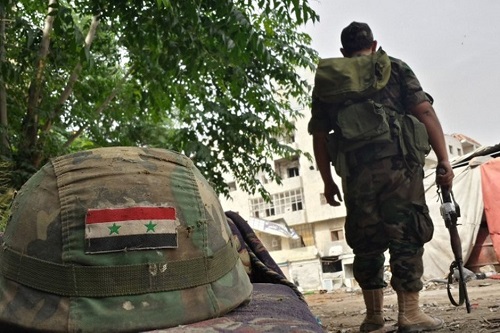AFP photo
By
Tom Arms
Politics hates a vacuum. It especially hates a vacuum in the tinderbox cockpit of the Middle East where the conflicting issues of money, vital resources, religious extremism, religious conflicts, historic rivalries and the geopolitical link between East and West dangerously clash.
The virtual collapse in 2011-2012 of Bashar al-Assad’s despotic regime in Syria created such a vacuum. It was filled by the even more despotic Islamic State Caliphate.
Now the Caliphate is on its knees. The Western half of Mosul is recaptured. Only a handful of IS fighters remain in the dangerously narrow winding streets of the Eastern half.
The fundamentalists once boasted that their Syrian-Iraqi base would become a springboard from which to launch an Islamic conquest of the Middle East and Europe. They have retreated to their spiritual capital of Raqqa in Syria for the final battle to the death.
They will lose. But who will win? And what will they win? Assad, Russia, the US and its Western allies, Iraq, the Kurds, Turkey, Iran, a score or more of rebel forces—all are directly involved in the fighting. Then there are the backers—or interested parties: Saudi Arabia, Israel, Qatar, Kuwait, the EU, the United Arab Emirates, Somalia, Afghanistan and the wider Islamic world.
It looks as if Assad will regain and remain in power for the foreseeable future—but he will be a political shadow of his former self. Neither the Trump Administration nor any of its European or Arab allies have any stomach for removing a secular despot who can be replaced by another fanatic Islamic despot. And besides, he will have the military support of Iran and Russia.
Russia and Iran are set to be the big winners. They gambled on Assad when he was all but dead and buried. They can expect payback in the form of military bases, political influence and lucrative contracts to rebuild war torn Syria.
This is not good news for the US and its allies. They do not want Russian influence back in the Middle East at a time when Moscow is also flexing its muscles in the Baltic and Ukraine and hacking into Western computer systems. They especially don’t want Iran to extend its regional tentacles.
Israel should have special cause for concern. To have Assad on its northeastern border was bad enough. To have an Assad backed by Iran and—presumably—with Iranian troops is the stuff of nightmares.
The EU will have mixed feelings. They don’t want expanded influence in the Middle East for Russia or Iran, but they would welcome a return to normality which would stem the tsunami of refugees.
Then there is Turkey and, of course, the Kurds. President Recep Tayyip Erdogan appears to have designs for revived Ottoman greatness. Relations with the EU and NATO have been relegated to the back seat in pursuit of his goal. Erdogan’s troops are in Northern Syria and he will want them to stay.
Standing in his way are the Turks’ traditional bête noire – the Kurds. They have been struggling for a homeland carved out of Syria, Iran, Iraq and Turkey for more than a century. They have been the boots on the ground for the US-led coalition and expect their reward. The question is: “Will America be in a position to give it?
Saudi Arabia and the Gulf States are even more worried about spreading Iranian influence than Washington. Moscow they can live with, but not Tehran. The end of the civil war in Syria would free up battle hardened Iranian troops for the fighting in Yemen and embolden Tehran to foment discontent among Shiite populations in Bahrain and Saudi Arabia.
For the rest of the Islamic world the approaching end of the Syrian civil war eliminates a focal point for their dissident fundamentalist populations. Its removal undermines the Jihadists but also means that thousands of angry battle-hardened Jihadists will be returning home—many of them still firm in their warped political-religious beliefs. You can destroy a state, but you can’t kill an idea.
As the end approaches the players jockey for pole position and the stakes and dangers increase inexorably. Current conflicts are not so much between crazed Jihadists and super powers but between Super Powers keen to retain or regain influence at the other’s expense. All sides are aware of the dangers, but the closer we come to the end the more determined they become to succeed, or, at the very least, prevent the other from succeeding.
Tom Arms is the editor of LookAheadnews.com. Sign up now for the weekly diary of world news events.
LookAhead Radio World Report for week commencing 26 June 2017:
Tom Arms
I am a journalist, entrepreneur and historian with extensive experience in print, web and broadcast journalism. I started as a diplomatic correspondent, wrote several books (The Falklands Crisis, World Elections On File and the Encyclopedia of the Cold War), and then in 1987 started my own business (Future Events News Service, www.fensinformation.com) which over 25 years established itself as the world and UK media’s diary. Our strapline was: “We set the world’s news agenda.” I sold FENS in December 2012 but retained the exclusive broadcast rights to all of FENS data. To exploit these rights I set up LookAhead TV which produces unique programmes which “Broadcasts Tomorrow Today” so that viewers can “Plan to Participate.” LookAhead has appeared regularly on Vox Africa, Radio Tatras International, The Conversation and Voice of Africa Radio.
In addition to being a syndicated broadcaster and columnist on global affairs, Tom is also available for speaking engagements and can be contacted on Twitter, Linkedin and email: [email protected].



No Comments Yet!
You can be first to comment this post!